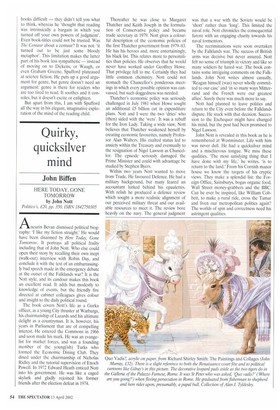Quirky, quicksilver mind
John Biffen
HERE TODAY, GONE TOMORROW by John Nott Politico's, £20, pp. 350, ISBN 1842750305 Aneurin Bevan dismissed political biography: 'I like my fiction straight.' He would have been disarmed by Here Today, Gone Tomorrow. It portrays all political frailty including that of John Non. Who else could open their story by recalling their own inept (walk-out) interview with Robin Day, and conclude it with the text of an embarrassingly bad speech made in the emergency debate at the outset of the Falklands war? It is the Nott style, and its candour makes this book an excellent read. It adds but modestly to knowledge of events, but the friendly fire directed at cabinet colleagues gives colour and insight to the daily political round.
The book covers Nott's life as a Gurka officer, as a young City thruster at Warburgs, his chairmanship of Lazards and his ultimate delight as a countryman. It is, however, his years in Parliament that are of compelling interest. He entered the Commons in 1966 and soon made his mark. He was an evangelist for market forces, and was a founding member of the young(ish) Turks who formed the Economic Dining Club. They dined under the chairmanship of Nicholas Ridley and the tutorial supervision of Enoch Powell. In 1972 Edward Heath enticed Nott into his government. He was like a caged skylark and gladly rejoined his former friends after the election defeat in 1974. Thereafter he was close to Margaret Thatcher and Keith Joseph in the formulation of Conservative policy and became trade secretary in 1979. Nott gives a colourful description of the economic policies of the first Thatcher government from 1979-83. He has his heroes and, more entertainingly, his black list. This relates more to personalities than policies. He observes that he would never have worked under Geoffrey Howe. That privilege fell to me. Certainly they had little common chemistry. Nott could not stomach the Chancellor's ponderous meetings in which every possible opinion was canvassed, but such doggedness was needed.
Thatcher's economic policy was seriously challenged in July 1981 when Howe sought an additional £5 billion cut in expenditure plans. Nott and I were the two 'dries' who (then) sided with the 'wets'. It was a rebuff for the Iron Lady. Taking a wide view, Nott believes that Thatcher weakened herself by creating economic favourites, namely Professor Alan Walters. His exalted status led to anxiety within the Treasury and eventually to the resignation of Nigel Lawson as Chancellor. The episode seriously damaged the Prime Minister and could with advantage be studied by Stephen Byers.
Within two years Non wanted to move from Trade. He favoured Defence. He had a military background, but many feared an accountant lurked behind his epaulettes. With relish he produced a defence review which sought a more realistic alignment of our perceived military threat and our available resources to meet it. The review bore heavily on the navy. The general judgment was that a war with the Soviets would be 'short' rather than 'long'. This limited the naval role. Nott chronicles the consequential furore with an engaging charity towards his naval tormentors.
The recriminations were soon overtaken by the Falklands war. The success of British arms was decisive but never assured. Nott felt no sense of triumph in victory and like so many soldiers he hated war. The book contains some intriguing comments on the Falklands. John Nott writes almost casually, 'Reagan himself (was) never wholly committed to our case' and 'in so many ways Mitterrand and the French were our greatest allies'. Surely there was much more to say.
Nott had planned to leave politics and return to the City even before the Falklands dispute. He stuck with that decision. Succession to the Exchequer might have changed his mind, but the post had been promised to Nigel Lawson.
John Nott is revealed in this book as he is remembered at Westminster. Life with him was never dull. He had a quicksilver mind and a mischievous tongue. We miss these qualities. 'The most satisfying thing that I have done with my life,' he writes, 'is to return to the land.' From his Cornish manor house we know the targets of his cryptic views. They make a splendid list: the Foreign Office, Sainsburys, bogus organic food, Wall Street money-grabbers and the BBC. Can he ever be inspired, like William Cobbett, to make a rural ride, cross the Tamar and liven our metropolitan politics again? The worlds of spin and correctness need his astringent qualities.


















































































 Previous page
Previous page